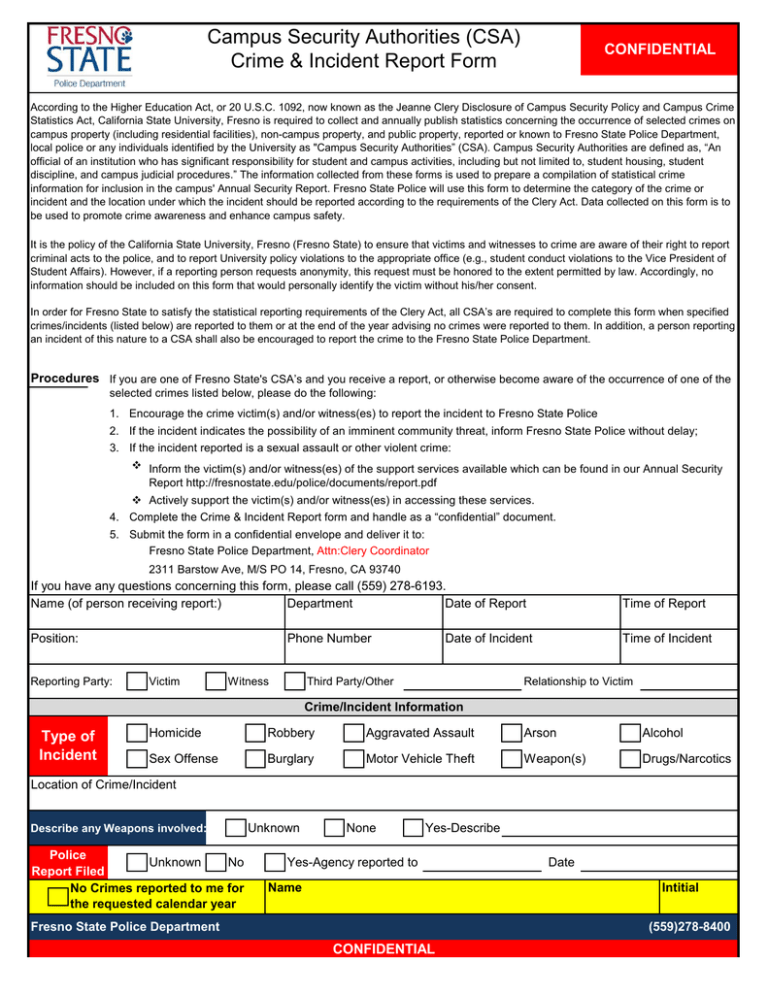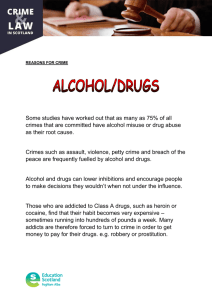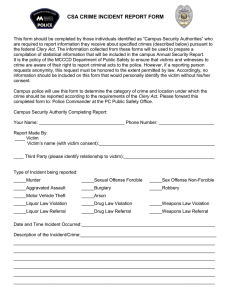
Campus Security Authorities (CSA)
Crime & Incident Report Form
CONFIDENTIAL
According to the Higher Education Act, or 20 U.S.C. 1092, now known as the Jeanne Clery Disclosure of Campus Security Policy and Campus Crime
Statistics Act, California State University, Fresno is required to collect and annually publish statistics concerning the occurrence of selected crimes on
campus property (including residential facilities), non-campus property, and public property, reported or known to Fresno State Police Department,
local police or any individuals identified by the University as "Campus Security Authorities” (CSA). Campus Security Authorities are defined as, “An
official of an institution who has significant responsibility for student and campus activities, including but not limited to, student housing, student
discipline, and campus judicial procedures.” The information collected from these forms is used to prepare a compilation of statistical crime
information for inclusion in the campus' Annual Security Report. Fresno State Police will use this form to determine the category of the crime or
incident and the location under which the incident should be reported according to the requirements of the Clery Act. Data collected on this form is to
be used to promote crime awareness and enhance campus safety.
It is the policy of the California State University, Fresno (Fresno State) to ensure that victims and witnesses to crime are aware of their right to report
criminal acts to the police, and to report University policy violations to the appropriate office (e.g., student conduct violations to the Vice President of
Student Affairs). However, if a reporting person requests anonymity, this request must be honored to the extent permitted by law. Accordingly, no
information should be included on this form that would personally identify the victim without his/her consent.
In order for Fresno State to satisfy the statistical reporting requirements of the Clery Act, all CSA’s are required to complete this form when specified
crimes/incidents (listed below) are reported to them or at the end of the year advising no crimes were reported to them. In addition, a person reporting
an incident of this nature to a CSA shall also be encouraged to report the crime to the Fresno State Police Department.
Procedures If you are one of Fresno State's CSA’s and you receive a report, or otherwise become aware of the occurrence of one of the
selected crimes listed below, please do the following:
1. Encourage the crime victim(s) and/or witness(es) to report the incident to Fresno State Police
2. If the incident indicates the possibility of an imminent community threat, inform Fresno State Police without delay;
3. If the incident reported is a sexual assault or other violent crime:
Inform the victim(s) and/or witness(es) of the support services available which can be found in our Annual Security
Report http://fresnostate.edu/police/documents/report.pdf
Actively support the victim(s) and/or witness(es) in accessing these services.
4. Complete the Crime & Incident Report form and handle as a “confidential” document.
5. Submit the form in a confidential envelope and deliver it to:
Fresno State Police Department, Attn:Clery Coordinator
2311 Barstow Ave, M/S PO 14, Fresno, CA 93740
If you have any questions concerning this form, please call (559) 278-6193.
Name (of person receiving report:)
Department
Date of Report
Time of Report
Position:
Time of Incident
Reporting Party:
Phone Number
Victim
Witness
Date of Incident
Third Party/Other
Relationship to Victim
Crime/Incident Information
Type of
Incident
Homicide
Robbery
Aggravated Assault
Arson
Alcohol
Sex Offense
Burglary
Motor Vehicle Theft
Weapon(s)
Drugs/Narcotics
Location of Crime/Incident
Describe any Weapons involved:
Police
Unknown
No
Report Filed
No Crimes reported to me for
the requested calendar year
Unknown
None
Yes-Describe
Yes-Agency reported to
Name
Date
Intitial
Fresno State Police Department
(559)278-8400
CONFIDENTIAL
Sex Offenses: rape; sodomy; sexual assault; fondling; statutory rape
Sex offenses are of special concern to the campus community because they have been historically under reported. The victim of a sex
offense typically desires confidentiality and anonymity, as a result he/she will often seek a reporting source other than law enforcement such
as a designated CSA. Because the sex offender may continue to pose a threat to the community, the threat potential needs to be evaluated
and the campus community alerted/warned as necessary. In this regard, the following additional information is requested.
Was the Assailant:
Unknown offender
Known Offender (friend, classmate, acquaintance, date, etc.)
Fresno State affiliated
Student
Staff
Faculty
Race/Gender
Age
Height
Weight
Hair Color
Eye Color Physical Characteristics
Description of
Assailant/Offender
Hate Crimes: hate crime information is required to be reported for each of the following crimes:
Fresno State is also required to report statistics for hate (bias) related crimes by the type of bias as defined below for the following
classifications: murder/non-negligent manslaughter, negligent manslaughter, sex offenses (forcible and non-forcible), robbery, aggravated
assault, burglary, motor vehicle theft, arson (see definitions above) and larceny, vandalism, intimidation, and simple assault (see definitions
below).
Was this incident motivated by hate or bias?
Unknown
No
Yes
If yes, identify the
category of prejudice:
Race
Religion
National Origin
Disability
Gender
Ethnicity
Sexual Orientation
Gender Idenity
Description of the incident or crime:
Fresno State Police Department
(559)278-8400
CONFIDENTIAL
Type of Incident Descriptions
Murder/Non-Negligent Manslaughter : the willful (non-negligent) killing of one human being by another. NOTE: Deaths caused by
negligence, attempts to kill, assaults to kill, suicides, accidental deaths, and justifiable homicides are excluded.
Negligent Manslaughter : the killing of another person through gross negligence
Robbery : the taking or attempting to take anything from value of the care, custody or control of a person or persons by force or threat of
force or violence and/or by putting the victim in fear.
Aggravated Assault : an unlawful attack by one person upon another for the purpose of inflicting severe or aggravated bodily injury. This
type of assault usually is accompanied by the use of a weapon or by means likely to produce death or great bodily harm. It is not necessary
that injury result from an aggravated assault when a gun, knife or other weapon is used which could or probably would result in a serious
potential injury if the crime were successfully completed.
Burglary : The unlawful entry of a structure to commit a felony or a theft. For reporting purposes this definition includes: unlawful entry with
intent to commit a larceny or a felony; breaking and entering with intent to commit a larceny; housebreaking; safecracking; and all attempts
to commit any of the aforementioned.
Motor Vehicle Theft : The theft or attempted theft of a motor vehicle. (Classify as motor vehicle theft all cases where automobiles are
taken by persons not having lawful access, even though the vehicles are later abandoned - including joy riding)
Arson : The willful or malicious burning or attempt to burn, with or without intent to defraud, a dwelling house, public building, motor vehicle
or aircraft, or personal property of another kind.
Weapon Law Violations : The violation of laws or ordinances dealing with weapon offenses, regulatory in nature, such as: manufacture,
sale, or possession of deadly weapons; carrying deadly weapons, concealed or openly; furnishing deadly weapons to minors; aliens
possessing deadly weapons; all attempts to commit any of the aforementioned
Drug Abuse Violations : Violations of state and local laws relating to the unlawful possession, sale, use, growing, manufacturing, and
making of narcotic drugs. The relevant substances include: opium or cocaine and their derivatives (morphine, heroin, codeine); marijuana;
synthetic narcotics (Demerol, methadone's); and dangerous non-narcotic drugs (barbiturates, Benzedrine).
Liquor Law Violations : The violation of laws or ordinance prohibiting: the manufacture, sale, transporting, furnishing, possessing of
intoxicating liquor; maintaining unlawful drinking places; bootlegging; operating a still; furnishing liquor to minor or intemperate person; using
a vehicle for illegal transportation of liquor; drinking on a train or public conveyance; all attempts to commit any of the aforementioned.
(Drunkenness and driving under the influence are not included in this definition.)
NOTE: The above listed crime definitions from the Uniform Crime Reporting Handbook
Sex Offenses- Forcible
Forcible Rape : “Penetration, no matter how slight, of the vagina or anus with any body part or object, or oral penetration by a sex organ
of another person, without the consent of the victim.”
NOTE: The above listed crime definitions from the Uniform Crime Reporting Handbook
Forcible Fondling: The touching of the private body parts of another person for the purpose of sexual gratification, forcibly and/or
against that person’s will; or, not forcibly or against the person’s will where the victim is incapable of giving consent because of his/her
youth or because of his/her temporary or permanent mental incapacity.
NOTE: The above listed Sex Offenses Definition From the National Incident-Based Reporting System Edition of the Uniform Crime Reporting Program
Sex Offenses- Nonforcible
Incest : Nonforcible sexual intercourse between persons who are related to each other within the degrees wherein marriage is prohibited
by law.
Statutory Rape: Nonforcible sexual intercourse with a person who is under the statutory age of consent.
NOTE: The above listed Sex Offenses Definitions From the National Incident-Based Reporting System Edition of the Uniform Crime Reporting Program
Type of Incident Descriptions
VAWA
Domestic Violence: The term ‘‘domestic violence’’ includes felony or misdemeanor crimes of violence committed by a current or former
spouse of the victim, by a person with whom the victim shares a child in common, by a person who is cohabitating with or has
cohabitated with the victim as a spouse, by a person similarly situated to a spouse of the victim under the domestic or family violence
laws of the jurisdiction receiving grant monies, or by any other person against an adult or youth victim who is protected from that
person’s acts under the domestic or family violence laws of the jurisdiction.
Dating Violence : The term ‘‘dating violence’’ means violence committed by a person—A) who is or has been in a social relationship of
a romantic or intimate nature with the victim; and (B) where the existence of such a relationship shall be determined based on a
consideration of the following factors:(i) The length of the relationship; (ii) The type of relationship; (iii) The frequency of interaction
between the persons involved in the relationship.
Stalking : The term ‘‘stalking’’ means engaging in a course of conduct directed at a specific person that would cause a reasonable
person to— (A) fear for his or her safety or the safety of others; or (B) suffer substantial emotional distress.
HATE CRIMES
Larceny : The unlawful taking, carrying, leading, or riding away of property from the possession or constructive possession of another.
Vandalism : To willfully or maliciously destroy, injure, disfigure, or deface any public or private property, real or personal, without the
consent of the owner or person having custody or control by cutting, tearing, breaking, marking, painting, drawing, covering with filth, or
any other such means as may be specified by local law.
Intimidation : To unlawfully place another person in reasonable fear of bodily harm through the use of threatening words and/or other
conduct, but without displaying a weapon or subjecting the victim to actual physical attack.
Simple Assault : An unlawful physical attack by one person upon another where neither the offender displays a weapon, nor the victim
suffers obvious severe or aggravated bodily injury involving apparent broken bones, loss of teeth, possible internal injury, severe
laceration or loss of consciousness.
_________________________________________________________________________________________
If a hate crime occurs where there is an incident involving intimidation, vandalism, larceny, simple assault or other bodily injury, the law
requires that the statistic be reported as a hate crime even though there is no requirement to report the crime classification in any other area
of the compliance document.
A hate or bias related crime is not a separate, distinct crime, but is the commission of a criminal offense which was motivated by the
offender's bias. For example, a subject assaults a victim, which is a crime. If the facts of the case indicate that the offender was motivated to
commit the offense because of his bias against the victim's race, sexual orientation, etc... the assault is then also classified as a hate/bias
crime.



